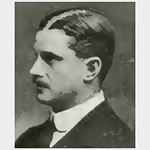Commemorated: | |||
| 1. Memorial: | Ypres (Menin Gate) Memorial, Flanders | ||
| 2. Book: | The (1921) Masonic Roll of Honour 1914-1918 | Pg.116 | |
| 3. Memorial: | The (1940) Scroll - WW1 Roll of Honour | 58A GQS | |
Awards & Titles: | |||
Early Life :
CAPTAIN RICHARD VINCENT BARKER, 1st BATTN. ROYAL WELSH FUSILIERS, born at Middleham, Yorkshire, was the son of the late Rev. Frederick Barker, Rector of Wimljorne St. Giles.Family :
Probate records show: BARKER, Richard Vincent. A Captain in H.M. Royal Welch Fusiliers. Died 30th October 1914 at Ypres on active service. Probate administered at London 22nd January to Arthur Lyle Birch - Solicitor. Effects £2373 1s 3d.Education & Career :
He was a Scholar of Winchester, and subsequently went to New College, Oxford. He was an undergraduate in 1899 when he joined Freemasonry, aged just 19.
Service Life:
Campaigns:
- The First World War 1914-1918, World-wide.
| Unit / Ship / Est.: 1/Royal Welsh Fusiliers |
1st Battalion August 1914 : in Malta. Returned to England, landing at Southampton 3 September 1914. 3 September 1914 : attached to 22nd Brigade in 7th Division. Landed at Zeebrugge 7 October 1914. Moved with the Division to Italy in November 1917. |
| Action : The Battles of Ypres 1914 (First Ypres) |
19 October - 22 November 1914. Following the failure of the German Schlieffen Plan in August and September 1914, both sides engaged in a series of linked battles as they sought to outflank each other. The climax of these manouvres was at Ypres in November 1914 when the might of the German Army attempted to break the much outnumbered British Expeditionary Force. The political importance of Ypres, being the last town of any size in Belgium that remained in allied hands, established its importance for both sides and ensured a series of battles over four years.
The First Battle of Ypres in 1914 is characterised by a series of linked heroic stands by outnumbered British soldiers in conditions of confusion and weary endurance. The Germans never knew how close they had come to winning - at one point just the clerks and cooks were the last line of defence for the BEF. By the end of the battle the magnificent original BEF, composed of professional regular soldiers, had been all but destroyed and already the Territorial battalions were called into battle. From the end of 1914 a 'Regular' battalion was in terms of its compostion little different to a Teritorial or later Service Battalion. The professional soldiers had all but vanished.
Detail :
When the Great War broke out Captain Barker was with his battalion in Malta, and, upon returning to England, was appointed Staff Captain to the 22nd Brigade, 7th Division, under Brigadier General Lawford. On the 31st October, 1914, at the Battle of Ypres, after very severe fighting for two days—when nearly all the regimental officers were killed and some men were falling back— Captain Barker, who was then attending to wounded men under a heavy fire, asked permission to rally them, and while leading them forward, fell shot through the chest. His Brigadier reported of him Quite exceptional, a good friend and splendid officer, no matter how hard the work and discomforts great, he was always cheerful. Captain Barker was mentioned, after his death, in Sir John French's Despatch of the 14th January, 1915. The Official History notes the involvement of Captain BARKER as 22 Brigade Staff Officer during the fighting near Ypres that cost his life; Page 334 …Captain RV Barker the staff captain of 22 Brigade had come to Major P J Foster commanding 2/Royal Warwickshires, now reduced to 200 all told, and warned him that the Bedfordshire, north of him, were being blown out of their trenches and that if they went back he was to swing his left to cover that flank, occupy a line of shallow holes that had been dug and hold on to it at all costs. Source; Official History Military Operations France & Belgium 1914 Vol I
Masonic :
| Type | Lodge Name and No. | Province/District : |
|---|---|---|
| Mother : | Apollo University No. 357 E.C. | Oxfordshire |
| Joined : | Old Wykehamist No. 3548 E.C. | London |
Initiated | Passed | Raised |
28th November 1899 | 30th January 1900 | 27th February 1900 |
Petitioned for and was a founder member of Old Wykehamist Lodge No 3548 at London, joining the same on 19th July 1911. He is recorded as being "Killed in action 30th Oct 1914" in the records at United Grand Lodge of England. It is evident that the principal officers of this new Lodge are also from Apollo Lodge and it is more than likely that Richard had become an experienced Freemason between initiation and becoming founder. Apollo Lodge lost more members than any other Lodge in the English Constitution through the course of the Great War.
Source :
The project globally acknowledges the following as sources of information for research across the whole database:
- The Commonwealth War Graves Commission
- The (UK) National Archives
- Ancestry.co.uk - Genealogy, Family Trees & Family History online
- ugle.org.uk - The records of the United Grand Lodge of England including the Library and Museum of Freemasonry
Additional Source:
- Founder Researchers : Paul Masters & Mike McCarthy
- Researcher : Bruce Littley

